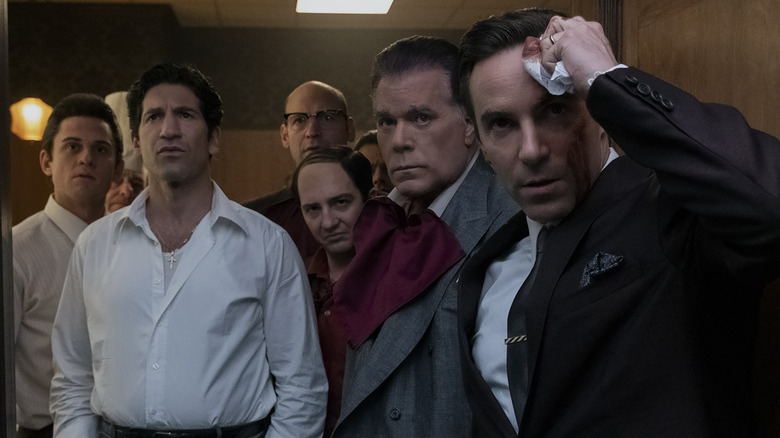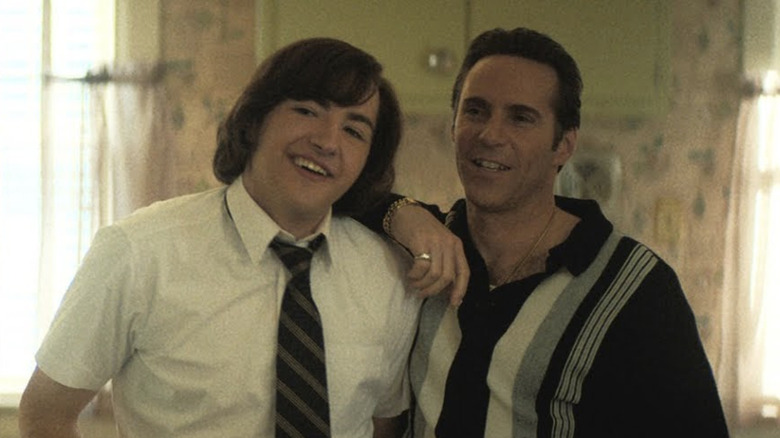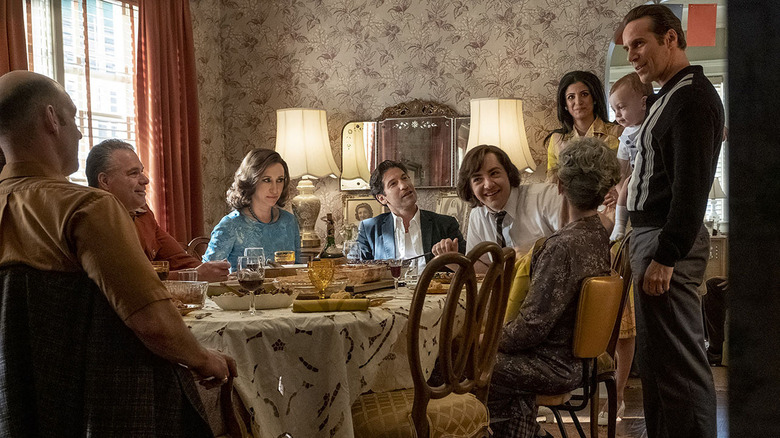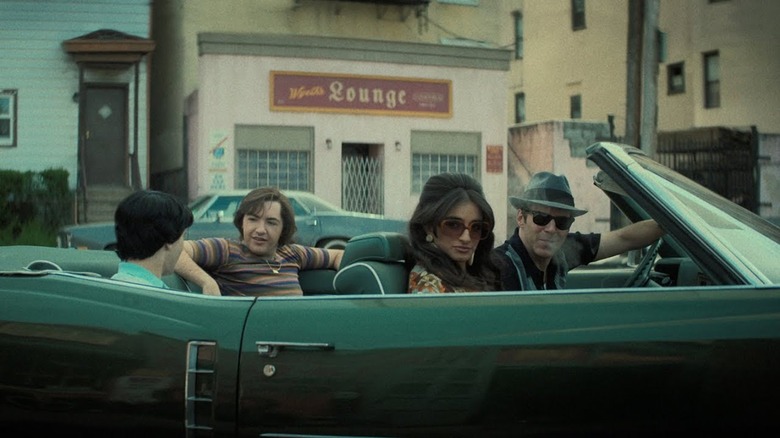The Sopranos Creator David Chase Doesn't Believe In The Good Ol' Days [Interview]
David Chase's laugh is infectious. The creator of "The Sopranos" and co-writer of its new prequel film, "The Many Saints of Newark," crafts great drama, but also real laughs. As violent and as gut-turning as his work can be, it's that sense of humor of his that helps make these grueling stories as entertaining as they are. So, it should come as no surprise that Chase appreciates a good joke.
That's what I came away with after talking to Chase for "The Many Saints of Newark," which takes place during "the good ol' days," as Tony Soprano always called them. There's nothing good about them, though — the prequel reaffirms history repeats itself. I recently sat down with Chase to talk about creating the world of the film (which he wants audiences to experience in a theater, not HBO Max) and how the good ol' days don't actually exist.
"I loved being with those characters again."
I really enjoyed experiencing this movie in a theater.
I'm really glad to hear that. It would be great if you write about that. We want to make sure that people go to see it in the movies. Here in the states, it's being released on the same day as streaming. So we really need people to go see it in the theater, not on their couch,
Since the movie is set in the '60s, did you feel freedom with the characters' voices? Since they're younger, you didn't have to write them exactly how you did in the show?
No, I mean actually, and to a slight extent, we needed less freedom in 1967 than we did in 2007. It wasn't hard at all. I mean, they were just, for me anyway, and I guess for Larry too, they're just in my blood and it was just like being back there. Like I'd just done it yesterday.
So, those voices never leave you?
Well, they don't come to me at night and wake me up.
[Laughs] Right.
I just knew who they were and it was always fun for me to write "The Sopranos." And it felt that way from the very beginning. I'm not saying it wasn't difficult, writing a screenplay, but I loved being with those characters again.
They're still hilarious.
Oh, good. The same for me. I mean, the thing about "The Sopranos" was always a pleasure to write because anything that the characters said, wasn't true. They lied 98% of the time. So you would write something and you'd know that's not what he's thinking. He's thinking the opposite of that. It was still a lot of fun to think that way.
Dickie is a great example of that. He keeps saying he wants to do good deeds, but I don't think he wants to be as good as he claims.
I would agree with you. "I want to do a good deed, I want to be good." Nobody's stopping it. I think that's a very, very wise insight.
Thank you. When it comes to the comedy, do you often write a line, and without even considering it a joke, an actor's delivery makes it a laugh?
Absolutely. Oh, absolutely. I don't know if you write comedy or drama, but what happens all the time is that things you thought were funny, don't get a laugh and things you thought were just like nothing, get a laugh because the performances are so good.
"Crystal clear. No bullsh*t."
Needle drops are a big part of the show and the film. Do you listen to music when you write?
I go there for inspiration, but not while I'm doing the writing. I listen to a lot of music all the time, especially when I'm working, but not when I'm actually sitting there. I mean, later on during the night, I'll do it. A lot of these things are dredged up from memory. I'll go, "Oh, that was a really good song." Or I've kept this catalog in my head of so-and-so I've always wanted to use. And then a movie situation will come up in which they fit very well.
One of the great needle drops from the show was "Every Breath You Take" mixed with the Peter Gunn theme. Where did that come from?
My wife. We were listening to "Every Breath You Take," and my wife said, "That's the same song as Peter Gunn." And we played them and they worked. So, we did this mash up and she has credit on it. I thought it was an amazing insight and it worked really well in that case because it was about espionage. Domestic espionage, yeah.
Do you write song choices in your scripts?
It's very seldom. It never really works. Unless you can really plan the show around that or something. You can think about these things in the abstract, but when you see it on the screen, it's completely different than it was on the page. You wind up auditioning many songs.
You've said before you and Alan Taylor got on well during the tone meetings for the show. He'd pushback more than most directors. Did you have a similar tone meeting for the movie?
No. Not at all.
Why are those meetings excruciating for directors?
I really don't know, because I'm also a director. I'm trying to think if I was going through it. Well, if I was going through it with someone who was, where we creatively saw eye to eye, which I would think I would be or otherwise, why would I be on the show? If I was intelligent, I might look at that as an opportunity to pick things up or to try things out, but they never do. They're only pissed off and in a hurry and they forget most of it anyway. When the bullets start flying, that all goes out the window.
You originally planned on directing the movie. How does Alan Taylor's vision compared to what you had in mind?
Oh, I would like to think it was different, but what he did was, I think, very universal. Crystal clear. No bullsh*t. Just really beautiful, beautiful directing. No nonsense, no tricks. You know, really good.
Your mother would take you quite a bit to Newark as a child. Any memories from that time that influenced the movie?
Well, there's a scene out in front of an Italian delicatessen. I remember my mother dragging me to those Italian delicatessens when I was little, but that's gone on all my life. So those things still exist. I don't really think so. It doesn't remind me, truthfully, of the Newark I knew then. It's faithful to what it was, but it doesn't spark any memories for me.
"There's no nostalgia."
Tony talked so much about the "good ol' days" on the show.
Yeah.
Walking out of the movie, I thought, those were the good ol' days?
[Laughs] That's great. That's great.
There's no sense of Tony's nostalgia for that time in this movie.
No, there was none, that's a good point. I never even thought of it, but you're right. There's no nostalgia. Maybe some of the music, some of it, maybe. Music does carry that, but no, there really wasn't.
Any key differences between writing a younger and older Tony Soprano?
I really can't say. Just trying to get into Tony's suit again, you know. We're the writers. Just make it up.
When you're writing, is it just more instinct? You don't always know exactly why you're doing it, but it just feels right, as a writer?
Yeah. That's true. Absolutely true. Absolutely true. I mean, that will be for every writer in the world ever. Otherwise, people would write nothing. Somebody sits down and starts to write imaginary characters. So, yeah. That's exactly true. It's just instinct, I say.
You've said Paulie is an incredibly difficult character to play. He's always been my favorite.
Everyone's favorite.
As funny as he is, though, the episode that was always one of my favorites was him thinking about death and the afterlife.
[Laughs] The reason I'm laughing is you reminded me of that. That he did think about that a lot. I think you can make the argument that "Sopranos" was about death and money. You could make that argument. So it wasn't only Paulie who was obsessed with death. He talks more about it. Somebody should go back and count the number of scenes we did in funeral homes or hospitals. We were always in and out of hospitals and funeral homes.
"Pine Barrens," death weighs heavy on that episode. Say for a tone meeting for an episode like that, what do you and [director] Steve Buscemi talk about?
I don't really remember anything particular. I mean, Steve was very, very professional, very knowledgeable and very easy to get along with. What happened was, we prepped the whole show, three weeks of it or whatever. We were supposed to come back from vacation and start shooting. And in between was a snow storm. That was just luck. And that made that episode. If it hadn't snowed, I don't know if it would've been as good. I don't think so.
Next year is the 10th anniversary of "Not Fade Away." I want to say, I'm a big fan of that movie. I saw it at an age where I really connected with it.
Oh, good. Really? How old were you?
I was 21, leaving home like the character around that time. How do you look back at that movie now?
I have a real case about that show. This gentleman named Tom Moore, who was really running Paramount, made sure that nobody saw it. And it was the centerpiece of the New York film festival. And then right after that, in October, they shut it down and they didn't, it sat on a shelf for two months. And then it came back in December with almost no marketing, no promotion. I'll say that. The other thing is, I believe I could have made a better movie.
Well, I really enjoy it.
Good. Well, I'm always happy to talk about it.
"The Many Saints of Newark" hits theaters and HBO Max on October 1st.



